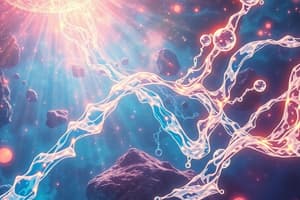Podcast
Questions and Answers
NaCl is considered a strong electrolyte.
NaCl is considered a strong electrolyte.
True (A)
Electrolytes are substances that conduct electricity only in their solid state.
Electrolytes are substances that conduct electricity only in their solid state.
False (B)
Electrolytes can be either ionic compounds or polar covalent compounds.
Electrolytes can be either ionic compounds or polar covalent compounds.
True (A)
The pH of a strong acid or base changes significantly with temperature.
The pH of a strong acid or base changes significantly with temperature.
The pH of a weak base decreases when the temperature increases.
The pH of a weak base decreases when the temperature increases.
Flashcards
What are electrolytes?
What are electrolytes?
Substances that conduct electricity when molten or dissolved in water.
Examples of strong electrolytes?
Examples of strong electrolytes?
NaCl, KCl, KNO₃, and NH₄Cl all dissociate completely into ions in solution.
Electrolyte chemical nature?
Electrolyte chemical nature?
Ionic or polar covalent compounds.
What is the pH scale?
What is the pH scale?
Signup and view all the flashcards
Weak acid and temperature?
Weak acid and temperature?
Signup and view all the flashcards
Study Notes
- Strong electrolytes like NaCl, KCl, KNO, and NHCl ionize completely when dissociated in an ionic solution.
- Electrolytes are substances able to conduct electricity in a molten state or aqueous solutions.
- Electrolytes can be ionic compounds or polar covalent compounds.
Related Concepts
- The pH scale measures the acidity or alkalinity of a solution.
- The pH of a strong acid or base isn't dependent on temperature.
- The pH of a weak acid decreases as temperature increases.
- The pH of a weak base increases with rising temperatures.
Studying That Suits You
Use AI to generate personalized quizzes and flashcards to suit your learning preferences.




